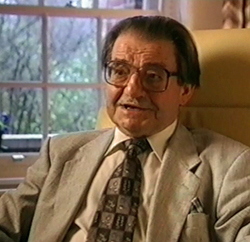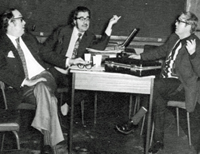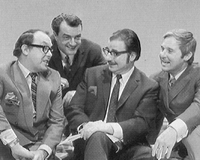John Ammonds Interview
Feature from 2013

John Ammonds

In rehearsals

Eric, Eddie, John and Ern
In 2007 he agreed to be interviewed for this website on the understanding that it never be published while he was still doing after-dinner speaking and events where the material would be used. We honoured that agreement and can now publish the interview as a tribute to the man that produced some of the finest shows across four decades.
John was an accommodating chap, very willing to dig deep into his past and reveal how he first got into the entertainment business.
“The way I got into the BBC is quite interesting.” He begins, settling down for what turned out to be a mammoth interview.
“It was the beginning of 1941 and I was just 16. I was at Grammar school and had just taken what would now be O levels, and did quite well. I was then doing the equivalent of A levels, but only manage the first year; I was bored with English, Latin, French and History.”
“Without telling my parents, I wrote to the BBC. I have no idea why, I just wrote and asked if they had any vacancies for junior engineers. That in its self was a bit of a liberty because I didn’t know anything about engineering at the time. My only experience was making little radio sets in the shed at the bottom of the garden using values and accumulators.”
Luck must have been on his side and the BBC answered his letter unexpectedly.
“I had applied at the time when the BBC had advertised for what they called sound effects operators.” He pauses, trying to think of a modern phrase to explain the role.
“They were known as sound effects boys, which is what they were really; I was only 16 and all of the older men were of course in the army. Some kind person must have passed my letter to the right department and as a result I got some literature through the post with various forms that required filling in with qualifications.”
He chuckles as he recalls those formidable forms.
“That didn’t take me very long because I didn’t have that many. I was hauled up for an interview at Broadcasting House in London, and got the job. The wage was, in today’s money, £1.35 a week.”
From a shed to the BBC by just a single letter, luck indeed was on his side. He enjoyed his early work, learning how shows were put together and all the elements required to fit perfectly together. His job was mainly creating live sound effects for radio shows, like opening doors, walking down gravel paths and for some strange reason, swimming underwater using a bowl and a straw to make the bubbles.
As parts of London were bombed out during the war, the BBC moved its entertainment department to Bristol, and John was asked he wanted to go.
“I thought it sounded interesting so accepted. Little did I know I would spend the next 30 years in variety with the BBC.”
The war spread though and Bristol was soon under threat due to the docks.
“The raids were pretty intense,” he recalls, “especially around the dock area. We were forced out and moved to Bangor in North Wales. The whole place went, engineers, actors producers, everyone; and took over old church halls for studios.”
“One of the shows I did there was something a few people may remember called ITMA with Tommy Handley. The show had a lot of sound effects; not just the standard opening and closing door, and most of the effects we actually did at the microphone. They were spot effects, done on the spot and not played back from records. It would have been difficult, especially with 78’s trying to get the timing right. We didn’t have the advantage of tape which you could queue in more easily. I’ve actually got a picture of myself blowing bubbles into a BBC soup bowl to produce an effect for a character called The Diver.”
Because there was no tape or digital playback, an important lesson he quickly picked up was timing. Live effects had to be timed to perfection of the joke was lost. This would later lead to much bigger and more famous work.
As he grew older, the Army came calling.
“I joined and spent 4 years there and eventually finished up in Army broadcasting in Hamburg. After two years there I came back and the BBC offered me a job. I finished up in the Odeon Hall in Bond Street London where the BBC light entertainment did most of their shows. We also did shows in the Palace cinema in Lower Regent Street. That’s where they did shows like Take It From Here and Stand Easy.”
“At the time I came out of the army I had been promoted to twiddling knobs and mixing sounds, I think our official title was Programme Engineer. We worked with all kinds of acts, big dance bands, Joe Lost and other names from the past.”
He got a chance to try something different and he quickly found he liked it.
© morecambeandwise.com 2013